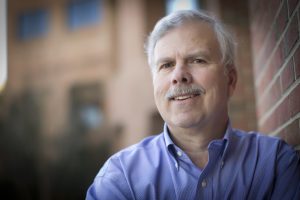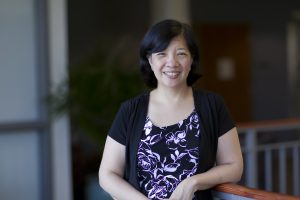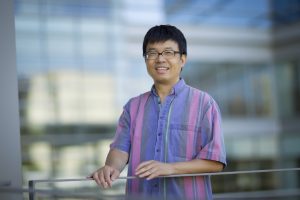University of North Carolina Lineberger Comprehensive Cancer Center’s 44th Annual Scientific Symposium will bring together experts from the United States and Canada to the William and Ida Friday Center for Continuing Education March 18-19 to share the latest on the biology of the immune system and cancer.
Researchers will speak on a variety of topics related to the biology of the immune system and cancer, including on immunotherapy treatments such as checkpoint inhibitors that release the “brakes” on immune cells, as well as findings about aspects of the immune system that suppress the tumor-killing response.

Through talks on both the potential for treatments that use the immune system against cancer, and ways the immune system can promote disease or cause autoimmunity, researchers will explore “The Yin and Yang of Immunity in Cancer.”
“There has been an explosion in the understanding of the biology of the complex tumor microenvironment,” said UNC Lineberger’s Albert Baldwin, PhD, Kenan Distinguished Professor and UNC Lineberger’s associate director for basic research. “We now understand that around tumors there are cancer-killing cells, but also there are immune cells that can promote tumorigenesis and suppress killing pathways. Understanding the complex immunity associated with cancer is leading to new and exciting therapeutic approaches for previously untreatable tumors.”

Baldwin is co-hosting the symposium with UNC Lineberger’s Jenny P. Ting, PhD, William Rand Kenan Professor in the UNC School of Medicine Department of Microbiology and Immunology and director of the UNC Center for Translational Immunology; and UNC Lineberger’s Lishan Su, PhD, professor in the UNC School of Medicine Department of Microbiology and Immunology.

The lineup of speakers includes four UNC Lineberger researchers and 10 scientists from around the country and Canada. Irving L. Weissman, MD, professor of pathology, developmental biology and biology at Sanford University and director of the Stanford Institute for Stem Cell Biology and Regenerative Medicine, will present one of the keynote talks. He is a leader in research of stem cells that give rise to immune cells like T-cells and B-cells. According to the American Association for Cancer Research, Weissman is considered the “father of hematopoiesis.” He was the first scientist to identify and isolate blood forming stem cells from a mammal in mice.
Another keynote speaker will be Arlene Sharpe, MD, PhD, chair of the Department of Immunology at Harvard Medical School and the George Fabyan Professor of Comparative Pathology. A pioneer in the discovery and research of checkpoint inhibitors, Sharpe was one of five scientists awarded the 2017 Warren Alpert Foundation Prize for their work to discover the PD-1 pathway.
Tak Mak, PhD, director and senior scientist at The Campbell Family Institute for Breast Cancer Research at the Princess Margaret Cancer Centre and professor in the Departments of Medical Biophysics and Immunology at the University of Toronto, will also deliver a keynote lecture. He is renowned for leading laboratory studies that resulted in the cloning of the T-cell receptor.
Giorgio Trinchieri, MD, chief of the Laboratory of Integrated Cancer Immunology and head of the Cancer Immunology Section at the National Cancer Institute, is focused on studying the role of inflammation and innate resistance and commensal microbiota in cancer generation, cancer progression and therapy. He has contributed to the identification of the interplay between inflammation and innate resistance and adaptive immunity.
“The symposium will feature experts who were studying the field of PD-1 before it was in vogue, to leading scientists who were pioneers in immunology, and in the understanding of the role of the microbiome in cancer,” Ting said.
The symposium will deal with what’s known as the “microenvironment” around a tumor. The tumor microenvironment can aid the immune system in killing tumors, but it can also be antagonistic to the immune system to prevent its defensive action.
“The ‘yin and yang’ of the immune system reflects that the system is so well regulated that you have strong positive forces to activate the immune system to fight diseases, and you have strong negative forces to attenuate it. In the case of cancer therapy, we’re often ramping up the immune system, but there are also concerns about ramping it up too much so that you can have autoimmunity,” Ting also said.
Attend the symposium
The symposium is free and open to the public, but registration is required. Lunch can be ordered as part of registration and costs $20 per day. For more information, contact Melissa Mack at (919) 966-0509, or emstroud@med.unc.edu.
